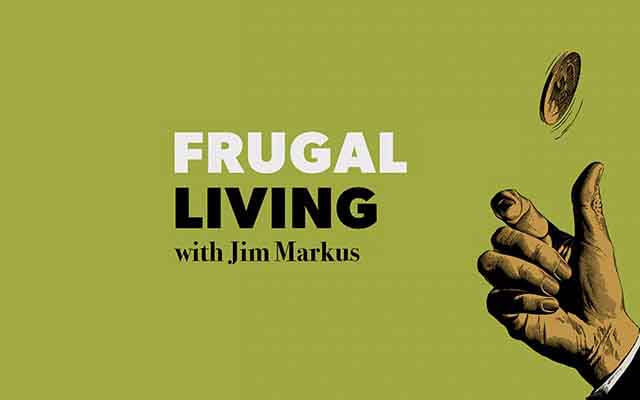Frugal Living: How can you beat inflation?
In this episode, Jim speaks with deal hunter and shopping expert Casey Runyan about inflation, skrinkflation, and more. Check out Frugal Living on Apple Podcasts, Spotify, Google Podcasts, Amazon, Anchor.fm, iHeartRadio, or anywhere you go to find podcasts.
Welcome to the summer of inflation. We recently discussed the history of credit scores and how to invest during uncertain times. But how do you beat inflation? This week, we talked with Casey Runyan about finding deals this summer.
Her advice? Look for savings in all your bigger expenses. If you were planning a home remodel this year, you might consider upgrading what’s already in your home instead of paying to replace it entirely.
 Runyan also warns listeners to watch out for shrinkflation. It’s pervasive this year, and it’s worth keeping an eye out while you do your grocery shopping. The best way to avoid shrinkflation? Break down prices by cost-per-unit. For toilet paper, use the price per paper square. For olive oil, consider the price per fluid ounce. Some grocery stores already list this information on the shelf. Others require you to do the calculation yourself.
Runyan also warns listeners to watch out for shrinkflation. It’s pervasive this year, and it’s worth keeping an eye out while you do your grocery shopping. The best way to avoid shrinkflation? Break down prices by cost-per-unit. For toilet paper, use the price per paper square. For olive oil, consider the price per fluid ounce. Some grocery stores already list this information on the shelf. Others require you to do the calculation yourself.
Finally, we learn a few frugal cooking tips. Our favorite? Runyan makes her own herb-infused cooking oil. She freezes it until she’s ready to use it.
Want the full in-depth conversation? Here’s a full transcript.
Read a Transcript From This Episode
Jim (00:02):
This is Frugal Living. <music>
Jim (00:10):
If there’s one word we hear all the time in 2022, it’s inflation. I wanted to talk to an expert with some unique insight on the subject. So I invited Casey Runyan back to the podcast. You might remember Casey from the $5 challenge episode or from the very first episode of Frugal Living. She’s the managing editor and vice president at Brad’s Deals.
Casey knows about inflation and she knows about finding deals. So I wanted to talk to her this week about what that means for us. What does a frugal-minded person need to know about inflation? Here’s our conversation.
Casey (00:47):
You know, I think the advice that I have for consumers who want to fight inflation is we cannot control the cost of gas. It’s hard to control the cost of housing. And even food can oftentimes be–you know, there are limits to what you can do there. I mean, sure you can, for gas, you can look for the cheapest gas station, but that’s realistically only gonna save you a few pennies per gallon.
And so where you really need to look at it is where else you can be saving. And maximizing all of the savings opportunities that you have elsewhere. And, and also just being really conscious of your budget. And the fact that, you know, if your gas costs have gone up by hundreds of dollars per month, you, you’re gonna need to make some adjustments to compensate for that.
Jim (01:36):
We can’t control gas prices, but if you got a gas guzzler, you’re gonna have to deal with it. Where can you save?
Casey (01:42):
You know, I think that it’s in the, the things that you are, are purchasing in more discretionary, purchases. And, you know, consider scaling back. Consider, you know, what you need. You know, it’s springtime. So I think, you know, people are thinking about home improvements right now. Well, this might not be the year to do a kitchen remodel or, or another big project. You know, you wanna try to, as much as possible, think for a big update rather than new. And look at the ways that you can make what you have last longer.
We’ve seen on the Brad’s Deals site Rust-Oleum deals have been doing really well. And that’s really no surprise because that’s an inexpensive way to give a new look to an area. You can also do things like changing out hardware. I’m also actually recommending people look at their spring cleaning as an opportunity for home improvement this year. . . Reclaiming a space that has become cluttered.
And, you know, and you can, you know, get maybe some simple organizers that don’t have to cost a ton of money. But that can actually be as fulfilling as buying, you know, new furniture or, you know, bigger purchases when you actually, you know, are like, “Oh my gosh, this area that I’ve had covered with stuff that slowly over time became a place more and more stuff got built up.” I’m really talking about my personal problems here. <laugh> But you know, that, that can be very fulfilling.
So looking for, for ways to, to say, “Hey, as a consumer, all right, I know I need to pump the breaks a little bit on, on these big purchases. But here’s how I can still get, you know, get the satisfaction that I want, uh, you know, out, out of the spring season.”
Jim (03:24):
I love that. I mean, especially as a frugal-minded person. And even without inflation, I love sitting down thinking about, “Oh, I’d love to have a new bathroom.”
Casey (03:33):
Mm-hmm.
Jim (03:33):
What can I do instead?
Casey (03:36):
Yeah. And we are also coming up on the season where, uh, garage sales and estate sales are gonna be, you know, a real possibility. And I do think those are not to be ignored. You can get some amazing deals. Now I will say, uh, it’s, I think it’s very important for people to understand that when you’re going to a garage sale or estate sale, you may not find anything.
There are no guarantees and you can be really excited. But I, a few years ago, was considering, you know, a patio set and went to some estate sales. And honestly, the stuff that I was seeing was not for me and and was fairly pricey. And wasn’t the right stuff. So, you have to go in with the mindset of knowing that you may very well leave with nothing. But looking for those opportunities, and, you know, sometimes you can get amazing stuff. I’ve also had success with Craigslist Free.
Jim (04:28):
Obviously, this is one of my favorite topics in general. I love estate sales. I love garage sales. But you talk about one area that’s unlikely to be hit by inflation early on. Like, the people who are gonna get hit by inflation first are going to be, “Are you shipping something from overseas?”
You know, these are, you know, big companies have massive costs associated with these types of things. Much less likely to be hit right now in the first round of inflation is the secondary market. One thing to consider, gas prices will affect, potentially, moving prices. So if you’re hiring movers, that’s something to consider when you’re planning to go to an estate sale. Even on Craigslist Free, if you don’t have a truck or you don’t have a van and you’re hiring someone else to do that, plan a little extra for the gas prices you’re gonna have to consider when booking a mover.
Casey (05:17):
Oh yeah, absolutely. Absolutely.
Jim (05:20):
So we talk about inflation a lot. But one thing that, I guess one topic that doesn’t get co–covered enough is the other side of that. What is shrinkflation?
Casey (05:29):
So shrinkflation is, uh, a term that describes when manufacturers change the amount of the product that you are getting. But they do so in a way that you’re not, that, they are hoping you’re not gonna notice.
So basically it’s, you know, putting a few, fewer Dorito chips in the bag, uh, even though the bag appears to be the same size. It is putting fewer sheets of paper towels or toilet paper on the roll, even though it’s still the double extra bonus roll or whatever, they’re, they’re describing it as. And so they’re, they’re just hoping that consumers won’t notice and it’s a way for them to increase their profit.
Jim (06:10):
So when I go to the grocery store, I look at, you know, price per ounce, price per whatever. They break it down at certain stores on certain products very well. How do you buy toilet paper? Like, how do you, how do you judge one versus the other?
Casey (06:24):
So you’re absolutely right. Getting down to that per-unit cost is your best bet. Toilet paper is complicated because there are different kinds of toilet paper. And if you’re looking at single ply versus double ply, that is a different calculation. Um, and those are very personal decisions, I think. Um, but, you know, you do want to get down to that per-unit cost so that you can understand and even compare between different size packs of the same product. Because they can vary.
And something that is really sneaky that I have found, uh, it’s the most sneaky form of shrinkflation. It’s not just that they’re changing the number of sheets that you’re getting. They’re also changing the size of the sheet often by, but, by not a lot. But, you know, I do think that I hit a new level of, of deal hunter the day that I realized I was calculating the square, the cost per square inch of the toilet paper.
Jim (07:25):
Fantastic.
Casey (07:27):
And, you know, I, I realize that that may not be for everyone, but it is something just to be aware of as you’re looking at it. You know, don’t put anything past them.
Jim (07:36):
When we think of real frugality. When we think of, you know, calculating the price per square inch of toilet paper or paper towels. Or the price per ounce of, you know, fluid ounce of a cleaning solution, we really get into those other questions that, you know, maybe if you’re too busy, these aren’t gonna be relevant to you. But if you got the time and it’s important to you to get the best deal, you can make your own cleaning solutions too. You can make a lot of your own stuff.
Casey (08:05):
Yes. Mm-hmm. Um, I actually use… Most of my household cleaning products are from a company called Blueland. There are other companies available too, that do, uh, concentrates. Um, I think there are others that do tablets. They, I chose them because they have, like, these nice high-quality bottles that you can buy and reuse. And they look really good. So I admit I was drawn in by the packaging as well. But you don’t have to use those. You can just use your old household cleaner bottle.
Jim (08:33):
I love this. And I’ve heard of this company and I’ve heard good things about this company, but I haven’t tried them. I’ve been hearing about this type of process for like a decade now. People trying to get waterless cleaning products delivered. And I think we’re starting to see it really shift. I think these are becoming much, much more popular. And I think it’s a really good option that I hadn’t considered in my own life that I’ll probably pick up this year. So thank you for reminding me to do that.
Casey (08:58):
Oh yeah. Yeah, no, it’s, it’s one of those that I was, I was glad when I finally… I thought about it for a long time and I finally, you know, bit the bullet and was like, “I’m, I’m going all in.” <music>
Casey (00:13):
<music> I think this summer we’re gonna see inflation impacting–and I mean this may be expected, but we’re gonna see it impacting travel a great deal. And, and I also think, you know, as we come, you know, out emerged from, from the pandemic state, that’s also impacting travel. And, you know, we are seeing, we’ve been seeing indications on Brad’s Deals that people are really looking at domestic travel, uh, much more so than, you know, far-flung, uh, overseas vacations.
And I think, you know, there’s a lot coming into play there, both in terms of the cost of travel and then also the, just the comfort level of knowing, you know, you’re not gonna get locked up in a quarantine hotel for three weeks if you happen to test positive, uh, in, in, you know, in the United States, in the continental United States. And that’s a big advantage right now, um, for sure. So I think, uh, but I do think we’re gonna see prices on domestic travel ticking up because I, I don’t think, you know, as you mentioned, it’s not going anywhere.
And I think that, you know, for a lot of, you know, vacation areas, they’ve been, uh, pretty low-key for the past several summers and they’re gonna be in hot demand this year. So I definitely would recommend booking early. Um, you know, traveling by car is a, is a very real option, but you are gonna have to account for that higher gas price. Um, for, uh, if you’re renting a car, I definitely always recommend that people, uh, just get the car rental booked, uh, you know, a refundable car rental booked as early as possible. And then you can keep hunting for deals. ‘Cause you can always cancel a car rental unless you specifically choose one that says you’re paying upfront to save X amount.
But, you know, don’t delay, don’t hold off because you’re thinking, “Oh, I might get a better deal in a week or a month.” Get that rental in place, because as we’ve seen, the prices on car rentals are very market driven. And it is not–like, they’re… Even if you think the price you’re seeing right now is high, uh, you may be feeling like that was the best price ever, you know, a month or two from now, so.
Jim (02:29):
Totally agreed. I mean it’s really hard especially with car rentals, and I mean with flights, to predict where those prices are gonna be in an area where, you know, prices are based on gas. You know?
Casey (02:41):
Right. Yeah.
Jim (02:42):
Um, on that note, probably a good summer for carpooling. If you’re going out somewhere with another family or with a larger group of people, taking one car, one larger car might make more sense, uh, if you can come from the similar location. And camping is an option for, for our listeners especially.
If you haven’t made plans in advance– I know booking a campsite in advance can sell out very quickly. But a lot of campsites will… They set aside some of their inventory for drive-ups. So it’s worth going, seeing if there’s anything available as early in the day as you can. And if you’re a camper, doing it that way.
Casey (03:22):
Yeah, no, national parks are, are a great resource. Uh, and you know, there are so many of ’em. And I think that people tend to gravitate towards some of the, the, you know, towards, you know, Yellowstone, Yosemite. And, but, like, there are lots of national parks and they are run to a very high standard. And also you can also explore parts of the, the, even the parks that aren’t the biggest tourist draw. The places that the tour buses don’t go, that’s where you wanna be.
Jim (03:52):
Great advice. One thing I learned recently too, and, you know, you might have this in the back of your head, but it’s probably a good reminder, but if you qualify for a military discount or a senior discount, national parks have these types of discounts. They also have annual discounts.
Do you go a lot? Do you bring your whole family, especially this early in the year? It’s probably worth looking at. You know, can you save money? Rather than getting the admittance fee every time you wanna go to a beach or a trail, just getting this annual pass.
Casey (04:22):
It’s worth doing the math to figure it out.
Jim (04:24):
Absolutely. And I mean, that’s a good theme of just the podcast in general. If you wanna save money, do the math. How much are you spending?
Casey (04:32):
Yes.
Jim (04:33):
And we will remember to put in the show notes, uh, on Frugal.fm, the, uh, where to go to get discounts on national parks, which, by the way, don’t apply to state parks. That is a separate thing.
Casey (04:45):
Yes, yes. Those are separate.
Jim (04:47):
Is there anything else that we need to know about inflation this year? Or what can we do to prepare over the next year?
Casey (04:54):
Yeah, I mean, I really think that it’s just about being mindful about your expenses. And, and, you know, checking in on them and considering what you’re using. I mean, it’s even the little things like, “Am I actually using my, uh, Showtime streaming now that, uh, Yellowjackets is done?” Or has it just been sitting there and I’m not actually using it? Because you can always turn it back on. There’s no penalty for that. And sometimes just toggling those things. I mean, if you can save 10 or $20 a month, that adds up.
And so just being really smart about those expenses, making sure to look at, you know, checking credit card statements to look for ongoing subscriptions. And, uh, the worst feeling in the world is when you realize there’s something that you’ve been signed up for that you’re not using. And just being mindful when you’re buying things. You know, is this a good price? Do I need this? And you know, what, what, what value is this, is this bringing me? Or can I defer this purchase?
Jim (05:53):
Really good advice. And this harkens back to something Marc Bautis mentioned on our financial advisor episode. Uh, the start of season four, he mentioned, like, cost cutting parties and doing exactly what you’re saying.
Make a time twice a year, sit down with your, you know, a friend or a significant other, and go through your credit card statement. And, like, it’s, this can be a fun thing. And, you know, worst case scenario, you find nothing. But best case scenario, you save yourself money every month because you cut out a subscription you weren’t using.
Casey (06:21):
Yeah. I, I just got a new phone and, uh, for, uh, magical reasons, it’s causing my phone bill to drop, uh, significantly. And, you know, and I’m like, “Wow, how long ago should I have done this?” And, you know, I, I mean, and we’re talking for, for, for two people down, I think, uh, you know, 50, $60 per month. And…
Jim (06:46):
That’s huge.
Casey (06:47):
So, that’s huge. And so it’s just, it’s worth checking into those things and, you know, making sure that you’re getting the best deal possible.
Jim (06:55):
Ah, that would seem to cover a gas increase. You know, even if you’re paying more for gas.
Casey (07:02):
I am one of those people who does not drive a whole lot just because of my city location. I actually use a tank of gas in about two months.
Jim (07:11):
That’s awesome.
Casey (07:12):
So, uh, I am very lucky in that I have lots of things in walking distance to me. I guess that’s why I live where I live. Um, and I do, you know, pay for that, that expense. But yeah, um, I, I am lucky to not have been hit there. But I am, you know, as everyone, I think it’s hitting everyone somewhere. Right? Uh, I’ve, I’ve definitely seen it in food costs. I like buying good, high-quality food and I’m like, “Whoa, this is expensive.”
Jim (07:40):
I’m with you there. My plan? Gardening. Lotta gardening this summer.
Casey (07:44):
Yes. Yeah, I, uh–Do you have your seeds started?
Jim (07:48):
Oh yeah. I mean, not enough of them. I don’t have enough space for all the seeds I want.
Casey (07:52):
Mm-hmm.
Jim (07:53):
I planted my seeds this year in, like, a very… Last year, it was like, “I wanna try everything.” This year, it’s like, “No, what do I eat the most of?” Like, I’m never going to run out of arugula. Like, I will have so much arugula, hopefully a bunch of onions, things that I never wanna run out of that I tend to spend the most money on. That’s what I’m planting this year. What about you?
Casey (08:12):
I, well, I’ve got my AeroGarden going strong. Um, and so, and that I use for herbs because I do spend way too much money on herbs and then I let them go bad. And then I’m so angry at myself because I’m like, “This was beautiful basil. And I used, like, almost none of it and now it’s no longer good.” So I love having the fresh herbs. A lot of my gardening is more flower, you know, not edible based. But I do plan on having… I’ll do a trailing type of tomato in a hanging basket. I worry about the wildlife in the area getting into some of my things. So I wanna have everything I wanna have sort of in hard-to-get-at spots. And I’m thinking about doing some peppers this year.
Jim (09:00):
Ooh, highly recommended.
Casey (09:02):
And I will, in addition to my basil indoors in the AeroGarden, I will also do some basil outside and probably some cilantro outside. Cause those just tend to grow really well. And then I get a bumper crop. And I love to do both with the AeroGarden and outside. I love to, uh, where you chop up the herbs and freeze them in little ice cube trays with oil so that you can have those to use whenever you want. Um, I actually get really bummed if I ever run out of them because I’m like, “Oh no, all I need is, like, my little thing of tarragon or, you know, whatever and, and I’d be set for this meal.” But, um, yeah, I, for me, that’s a big cost saving cause I can easily drop, you know, way too much money just buying, like, herbs.
Jim (09:46):
Same. I love that. There’s no better feeling than knowing that this has been growing on my windowsill. I know exactly where it came from. You talk about knowing where your food comes from. This came two, two and a half feet from the left.
Casey (09:59):
Yes. Yeah, no, I was, you know, it takes a little while for an AeroGarden to get going to where you can actually–But I was like, “Okay.” I was like, “Oh, you’re ready for your first harvesting.” Like, I’m, you know, and I, you know, I don’t even know what I’ll use it for first. But it’s literally you can pluck a couple basil leaves and throw it into your scrambled eggs, you know. And, and you’ve instantly upgraded that dish.
Jim (10:23):
Love that. Tell me more about using… So you’re freezing herbs in oil, in, like, an ice cube tray?
Casey (10:31):
Yeah, I get, I have two that have, they have a silicone bottom, so they’re really easy to pop out. And they’re very small cube sizes. You don’t want, like, big ones. What I do is I just put about, I would say probably about a tablespoon of only chopped herbs in each, uh, each one. And then I cover the herb with oil, with olive oil. And then, you wanna pop, you do need to label them if you’re doing more than one herb in a tray to make sure. Because you wanna be able to put them, pop ’em out, put ’em in plastic baggies, and label them with what it is so that you know. So that you’re not thinking like, “Oh.” Uh, you know, like, cause they all look the same once they’re frozen. Really. Uh, but you don’t wanna mistake, you know, your basil for sage or something. You wanna know which is which.
Jim (11:22):
And you’re dropping them right out of the freezer? Out of–You have kept them in little bags in the freezer. You drop ’em right into your pan?
Casey (11:27):
Yep, exactly. And so they, and, and, and you just adjust the amount of oil that you’re using, but it’s not a ton of oil. But yeah, you just put that in. You can, you know, for some herbs, for, like, basil, like, I like to put basil in more towards the end of the cooking process because it’s such a tender herb. But, like, for things like rosemary and, and, and thyme, those I, I would often add earlier in the process.
Jim (11:52):
All right. So we need to definitely do a cooking episode then because all of this is too good not to use.
Casey (11:57):
Yeah, no, it’s honestly, it’s, it’s a great thing. The other thing I will say, uh, if you’re not saving your Parmesan rinds and freezing them, you should be because they are the best. If you add those to soup, they instantly, like, ratchet up that umami flavor. You don’t eat the rinds, but it just sits in there and, like, spreads its, like, cheesy goodness.
Jim (12:19):
Yeah. These are, these are tips I’ve never heard before but will change the way I cook forever. Huge thanks to our guest this week, Casey Runyan. Our audio editor this week was me, Jim Markus. Frugal Living is brought to you by Brad’s Deals. That’s B R A D S D E A L S.com. I’ve worked at Brad’s Deals for more than five years. Every day, the editorial team finds new deals online. They price compare. They check coupon codes. Sometimes they find exclusive offers. And it’s available to you for free.
If you go to BradsDeals.com, you’ll see new offers every day, including some offers that may still be live from earlier this week. But if you want the freshest offers, go to the site, click on New Deals or sign up for the newsletter. You can find Brad’s Deals the same place you find our show notes and transcripts at Frugal.fm.
Frugal Living is also available on TikTok. We’ve had a really pretty surprising reaction from a video we posted about, uh, my rain barrel. I have a rain barrel on the side of my house. And it’s surprisingly controversial. If you wanna see this controversial video, check out frugallivingpod on TikTok. You can also connect with us on Twitter or Facebook or LinkedIn, all at frugallivingpod. Again, our show notes are available along with our transcripts at Frugal.fm. And if you like the show, please leave a review on iTunes. <music>
More About Frugal Living With Jim Markus
Frugal Living is a podcast for smart consumers. How do you spend less and get more? The show, sponsored by Brad’s Deals, features interviews, stories, tips, and tricks. Jim Markus hosts season five, out now.
The post Frugal Living: How can you beat inflation? appeared first on The Brad's Deals Blog.









